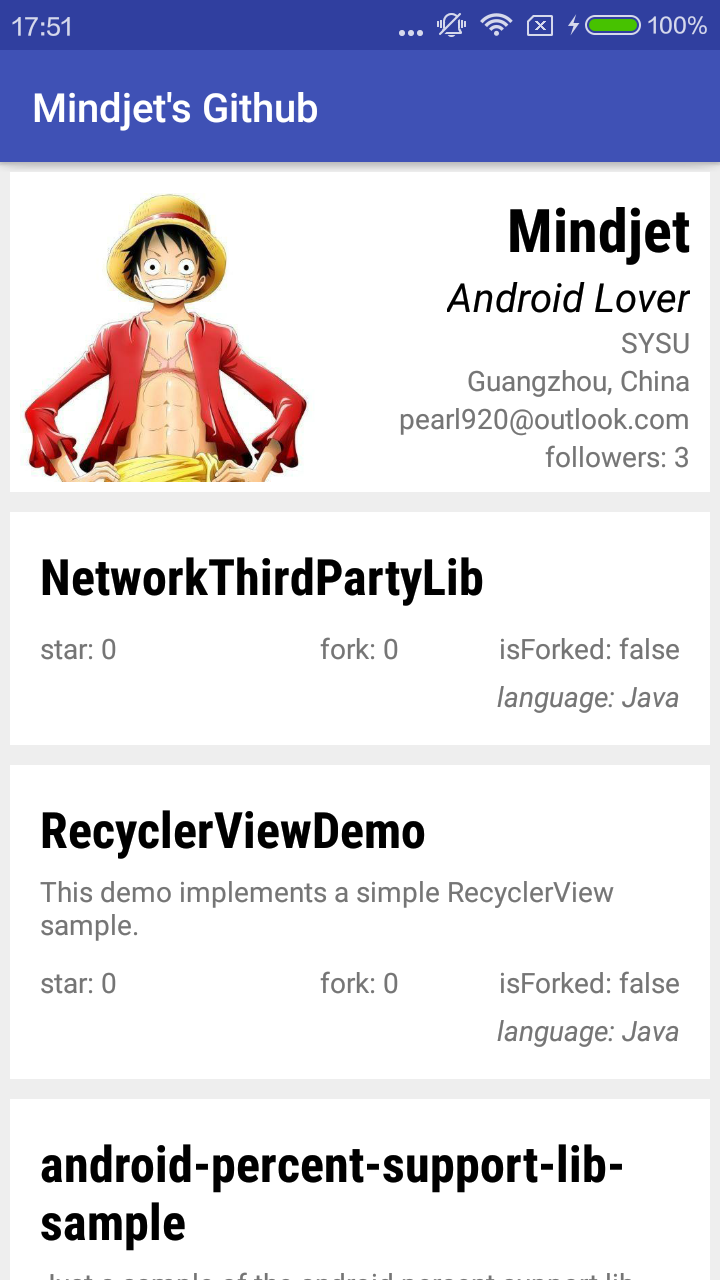
OkHttp+GithubApi
- coding
- android
- httpclient
This post introduces how to use Github-Api and how to fetch data with Okhttp, decode data in json with Gsonand display items with RecyclerView.
And oh, of course all I do is based on Android.
Fetch data
With Github-Api, it’s simple to get information from Github.com. Here I fetch profile of my github account, and information of all my repos.
From this guide, we know that using:
GET https://api.github.com/users/:username/repos
can list someone’s repos.
Using OkHttp makes it much easier.
The code fragment below is what I do with OkHttp to get results:
private final String REPO_USER_PREFIX = "https://api.github.com/users/";
private final String REPO_USER_POSTFIX = "/repos?sort=created"; //get the repos sorted by created date
//with this url, we can get the information of all repos of specific user.
String url = REPO_USER_PREFIX + userName + REPO_USER_POSTFIX;
final Request request = new Request.Builder().url(url).build();
mOkHttpClient.newCall(request).enqueue(new Callback() {
@Override
public void onFailure(Call call, IOException e) {}
@Override
public void onResponse(Call call, Response response) throws IOException {
if(response.isSuccessful())
System.out.println(response.body().string());
}
}
Ok, now I get the repos of mine, and the results come back in format of Json like:
[
{
"id": 64843937,
"name": "Algorithm",
"full_name": "Mindjet/Algorithm",
"owner": {
"login": "Mindjet",
"id": 17674741,
...
},
"private": false,
"description": "some practises from nowcoder.com and leetcode.com",
"fork": false,
"stargazers_count": 0,
"watchers_count": 0,
"language": "Java",
"forks": 0,
"watchers": 0
...
},
{
"id": 65451339,
"name": "android-open-project",
"full_name": "Mindjet/android-open-project",
"owner": {
"login": "Mindjet",
"id": 17674741,
...
},
"private": false,
"description": "some practises from nowcoder.com and leetcode.com",
"fork": false,
"stargazers_count": 0,
"watchers_count": 0,
"language": "Java",
"forks": 0,
"watchers": 0
...
},
...
]
Decode data
Next, we are gonna decode the Json to POJO.
Gson can help us do this, but first of all we need to implement a Java Object consists of the member variables we need. A Java Object stores information of a repo.
Let’s make a Java Object named RepoInfo:
public class RepoInfo {
@SerializedName("name") public String repoName = null;
public String description = null;
@SerializedName("fork") public boolean isForked = false;
@SerializedName("language") public String codeLang = null;
@SerializedName("forks_count") public int forkCount = 0;
@SerializedName("stargazers_count") public int StarCount = 0;
}
Do remember to use annotation @SerializedName wherever your variable name is not the same as the key name in the Json.
After this, the Json can be easily transfer to Java Object using Gson like this:
Gson mGson = new Gson();
List<RepoInfo> mRepoInfoList = mGson.fromJson(response.body().string(), new TypeToken<List<RepoInfo>>() {}.getType());
The decode operation is supposed to be done in a worker thread, like in onResponse method.
Now we get what we want.
Display data
RecyclerView is an excellent view that can display items perfectly. You can visit another post (RecyclerView) to see how to use it. (The post is in Chinese.)
Screenshot

Oh you may ask that how can I get the profile of a specific user like the first item in the picture.
You can get it by:
GET https://api.github.com/users/:username
The result still comes back in Json, I am sure that you can decode the it and display it just in the same way I do above.
Source code
You can get the source code from my repo NetworkThirdPartyLib.
The code about this post is mainly in GithubActivity.java and GithubAdapter.java.